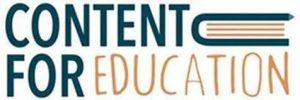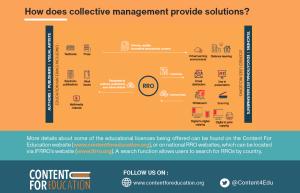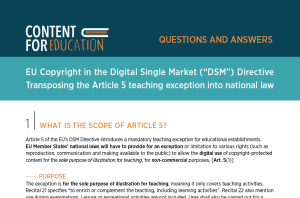EWC joined the Content4Education Campaign, to support writers and translators during the period of a fair implementing of the DSM Directive. The EU Copyright in the Digital Single Market (“DSM”) Directive 2019/790, adopted in April 2019, includes a mandatory exception to copyright under Article 5 for the “digital use of works and other subject matter for the sole purpose of illustration for teaching”. EU Member States have until 7 June 2021 to transpose the Directive into national law, with some flexibility in how they do so.
What EWC Members say:
Nina George, Author, EWC President – Germany
.jpg)
Pandemic conspiracy theories in the social networks, extreme political tendencies, fake news factories and government leaders who ignore science and thereby plunge their nations into chaos and misery: we live in a disturbing present in which facts, knowledge, education and well-founded findings have become the most important counterbalance to destructive developments and phenomena of world society. Profound and independently elaborated facts are the backbone of humane civil society.
It is all the more essential to cultivate, promote and protect the sources of these values of knowledge, education, science and teaching: the authors. It is not only climate change that has taught us that sustainability is of paramount importance. This also applies to all dealings with authors’ rights and with copyrighted works and their origins: Nationally stable legal frameworks with a simultaneous forward-looking budget for school and teaching materials and for the authors are a logically imperative investment. It is the vaccination we need to make humane, wise and free decisions.
Article 5(4) of the DSM Directive expressly allows for example the German legislator to provide for remuneration. It is therefore imperative to retain the existing remuneration claim – which is subject to the obligation to pay a Collective Management Organisation – under Articles 60a, 60h (4) UrhG.
This is the only way to preserve substantial knowledge, which is needed more than ever to maintain social immunity against populism and antipluralism.
I refer further to the statement of VG Wort: https://www.vgwort.de/fileadmin/pdf/stellungnahmen/Stellungnahme_Umsetzung_EU-Richtlinien.pdf

Morten Rosenmeier, Professor of copyright law and chairman of the Committee for the Protection of Scientific and Scholarly Work (UBVA) – Denmark

It takes thousands of hours to write a copyright textbook. If the law students are to learn anything it simply has to be of high quality. Much of it is written in my spare time, including weekends and holidays. Copyright and licensing provides an important economic incentive for me, as well as for the publisher who publishes the book. It is not acceptable that EU Member States’ implementation of the new EU copyright law could leave authors in a position where their work is used/copied for free. Why would I spend all that time and effort writing a textbook if everybody can just copy it for free? If I have no remuneration when my textbook is copied, it will no doubt lessen my incentive to spend thousands of hours writing it. If works can be used without limits and remuneration it will no doubt mean that we will get fewer textbooks and the ones we will get will be of a lower quality than the ones we have now.

Carlos Fortea, Author, translator and teacher at the Universidad Complutense de Madrid – Spain

My life revolves around the book, because I am a novellist, because I am a translator, because I am a university professor. This triple condition has made me aware, since a long time ago, both of the fundamental importance of copyright and the need to guarantee the right to information.
For many authors, copyright is not only a form of property, but a source of livelihood: living to write entails living from writing, and that implies that it is necessary to respect creation and remunerate it. This applies to the direct creation by authors, indirect creation by translators, and the scientific creation by professors.
We are dealing with a task with high added value: it requires many years of formation, much trial and error, much effort, constant updating. From it live many other members of the value chain of the book. Even then, we understand it is necessary to enable students and readers to access part of our work, but this must be done with fair conditions. And fair conditions mean licences, rules, the agreed remuneration that allows us to carry on with our work. To respect creation is to respect culture.
If you are interested to learn more visit the official website: www.contentforeducation.org or download the Content4Education brochure and the FAQ:



